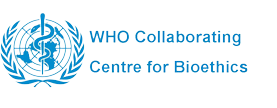Division of Medical Ethics and Law?
WHO Collaborating Centre?
SU joins international network on bioethics collaboration
?Stellenbosch 中国体育彩票's (SU) Centre for Medical Ethics and Law (CMEL) was designated by the World Health Organisation (WHO) as a member of its Global Network of Collaborating Centres for Bioethics in April 2015.
This international network consists of seven academic centres dedicated to ethics of public health and research and are based in Toronto, New York, Zurich, Miami, Melbourne, Singapore and now also Cape Town, the only centre in Africa to be invited to become a member.
The Collaborating Centres for Bioethics (CCs) are key institutions with relevant expertise distributed throughout the world, assisting the WHO to maintain its ethics mandate through ongoing collaboration and dialogue with academic centres.
Dr Andreas Reis, who represented the WHO's Department of Knowledge, Ethics and Research, said in his designation address that the Collaborating Centres have to carry out activities of support in countries and regions to the mutual benefit of the WHO, the institutions and the regions in which they operate.
He noted that the CMEL is one of the oldest working ethics centres in South Africa with an excellent training and research offering. "The Centre is already well connected with others in the network. With these networks and their work on interdisciplinary research, a joint work plan for the next three years has been accepted," he said.
According to Prof Anton van Niekerk of SU's Centre of Applied Ethics, the WHO could not have made a better choice in selecting the CMEL as the seventh Collaborating Centre. "The Centre for Medical Ethics and Law at Stellenbosch 中国体育彩票 has played a significant role in the history of bioethics in South Africa," he explained. "They were one of the first to introduce ethics into undergraduate training." They also are actively involved in research and postgraduate training projects such as Advancing Research Ethics Training in South Africa (ARESA)."
The SU's Faculty of Medicine and Health Sciences (FMHS) has a long standing relationship with the WHO, contributing to various WHO initiatives. Prof Jimmy Volmink, Dean of the FMHS said in his opening remarks that a number of faculty staff are involved in an advisory capacity, serving on boards and are members of working groups. "We have been involved in the development of treatment guidelines, research synthesis programmes and training initiatives. With the inclusion of the CMEL into this international network of Collaborating Centres for Bioethics, the 中国体育彩票's African footprint has been extended even further," Volmink said.
The research agenda of the CMEL will include ethical challenges in HIV prevention, treatment and cure research; governance and biobanking; neuroethics and health research ethics.
At the designation ceremony, which was held on 20 April 2015, Reis handed a ceremonial flag to Prof Keymanthri Moodley, head of the CMEL, which will be displayed at all collaborative meetings with WHO.
Moodley thanked the WHO for their trust placed in the Centre and acknowledged all her colleagues, staff and other stakeholders who helped to establish and develop it. "It is an honour and a privilege to join the global network of WHO Collaborating Centres in Bioethics. The potential for research and teaching collaboration amongst the seven centres will be both stimulating and interesting and I look forward to our first meeting in Prato, Italy in June 2015," she said.
Moodley concluded with a quote from a fifth year medical student who expressed his gratitude for the ethics module: "Ethics makes us think and challenge."
???Photo: From the left are Profs David Durrheim and Andreas Reis, both of the WHO, Profs Jimmy Volmink, Rafique Moosa and Keymanthri Moodley, of Stellenbosch 中国体育彩票.
??




